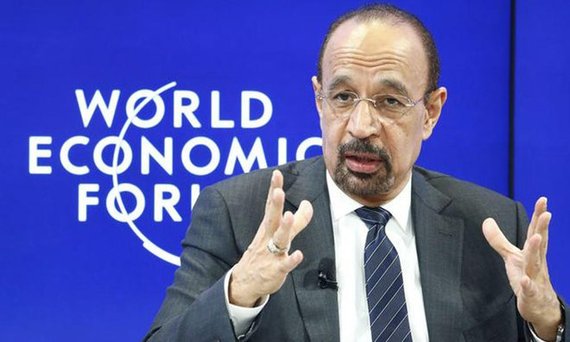Saudi Energy Minister Khalid Al-Falih attends the World Economic Forum in Davos, Thursday. (Reuters)DAVOS, Switzerland: Saudi Arabia aims to become a "major exporter" of renewable energy, its energy minister has revealed.
Khalid Al-Falih said there are plans to allow for the export of cleanly produced electricity to Europe.
"If the region gets connected to Europe for example, then solar (power) that is produced in Saudi Arabia can be exported all the way to Europe through a network," he told Arab News on the sidelines of the World Economic Forum meeting in Davos.
"When it's sunny in the region, it's dark and cloudy sometimes in Europe... So we can be a major exporter."
Such an electricity supply could be routed through Egypt, and there were "projects underway" to support this, Al-Falih said.
Al-Falih said on Monday that Saudi Arabia is to launch a renewable energy program that is expected to involve investment of between $30 billion and $50 billion by 2023.
Riyadh plans to start the first round of bidding for projects under the program, which would produce 10 gigawatts of power.
Aside from the domestic consumption of electricity, Al-Falih said there was an opportunity to sell both power derived from "green" methods and the materials used to produce renewable energy, like solar panels or wind turbines.
"We will export the power itself, we will export the components and services," he said.
Saudi Arabia is attempting to diversify its economy after it was hit hard by the oil-price crash.
An OPEC deal saw an oil production cut come into force at the beginning of this year, something Al-Falih indicated was being adhered to.
"Everybody I talk to is not only committing, some of them have actually told me that they have exceeded their commitments," he said.
He would not speculate on how the oil price would look later this year, but said the current figure includes "an element of uncertainty" about compliance with the Opec production cut deal.
"I tend to think that uncertainty is misplaced," Al-Falih said. "Once you remove that, with data coming in the weeks to come, you can only imagine where the price will go."
*This blog was originally published in Arab News.
Support HuffPost
Our 2024 Coverage Needs You
Your Loyalty Means The World To Us
At HuffPost, we believe that everyone needs high-quality journalism, but we understand that not everyone can afford to pay for expensive news subscriptions. That is why we are committed to providing deeply reported, carefully fact-checked news that is freely accessible to everyone.
Whether you come to HuffPost for updates on the 2024 presidential race, hard-hitting investigations into critical issues facing our country today, or trending stories that make you laugh, we appreciate you. The truth is, news costs money to produce, and we are proud that we have never put our stories behind an expensive paywall.
Would you join us to help keep our stories free for all? Your contribution of as little as $2 will go a long way.
Can't afford to donate? Support HuffPost by creating a free account and log in while you read.
As Americans head to the polls in 2024, the very future of our country is at stake. At HuffPost, we believe that a free press is critical to creating well-informed voters. That's why our journalism is free for everyone, even though other newsrooms retreat behind expensive paywalls.
Our journalists will continue to cover the twists and turns during this historic presidential election. With your help, we'll bring you hard-hitting investigations, well-researched analysis and timely takes you can't find elsewhere. Reporting in this current political climate is a responsibility we do not take lightly, and we thank you for your support.
Contribute as little as $2 to keep our news free for all.
Can't afford to donate? Support HuffPost by creating a free account and log in while you read.
Dear HuffPost Reader
Thank you for your past contribution to HuffPost. We are sincerely grateful for readers like you who help us ensure that we can keep our journalism free for everyone.
The stakes are high this year, and our 2024 coverage could use continued support. Would you consider becoming a regular HuffPost contributor?
Dear HuffPost Reader
Thank you for your past contribution to HuffPost. We are sincerely grateful for readers like you who help us ensure that we can keep our journalism free for everyone.
The stakes are high this year, and our 2024 coverage could use continued support. If circumstances have changed since you last contributed, we hope you’ll consider contributing to HuffPost once more.
Already contributed? Log in to hide these messages.

